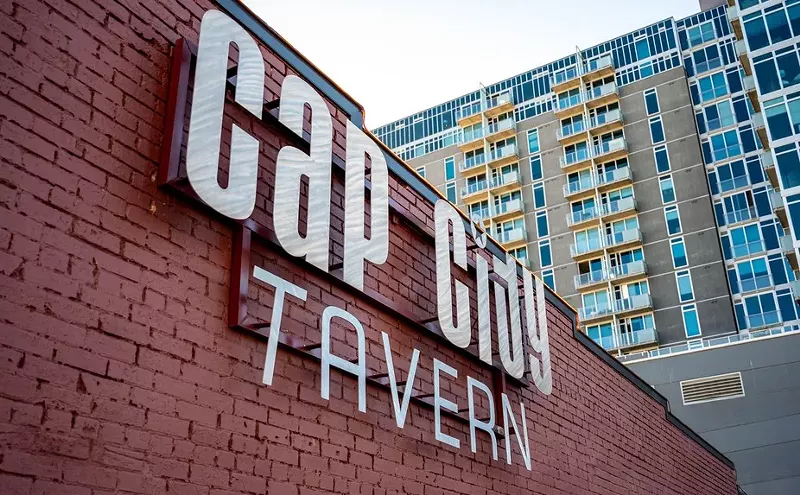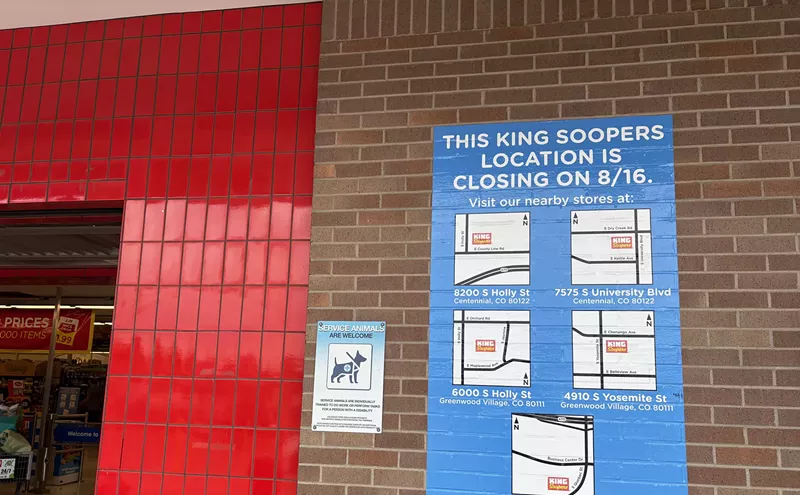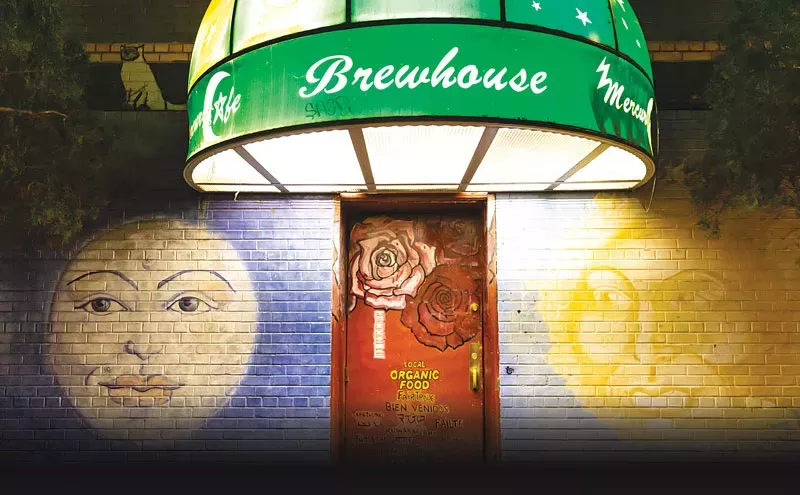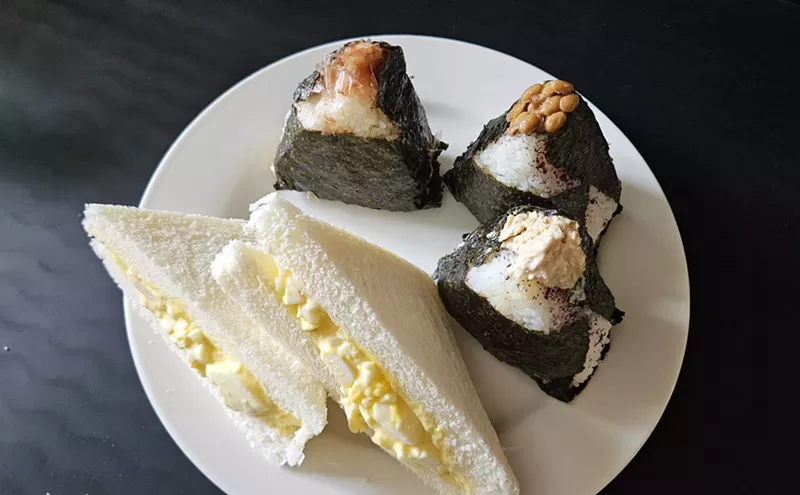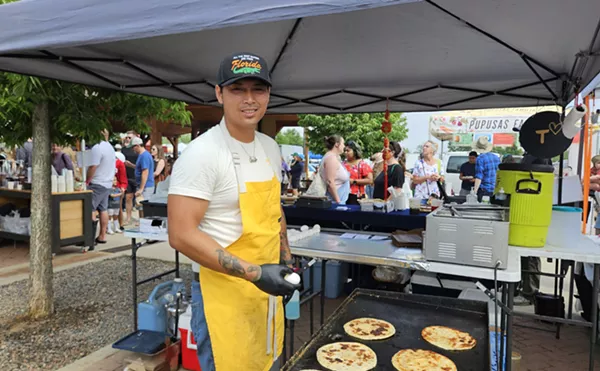This is part one of my interview with Kevin Taylor, executive chef of Restaurant Kevin Taylor, Prima Ristorante, Limelight, Kevin Taylor's at the Opera House, Palettes at the Denver Art Museum, and Rouge, in the Teller House in Central City. You can read part two of my chat with Taylor tomorrow.
Ask anyone who's lived through Denver's restaurant revolution to name the city's pioneering chef -- the guy who put the Mile High City on the culinary map -- and they're likely to answer Kevin Taylor. The Colorado native opened Zenith American Grill back in 1987, and his restaurant empire currently stands at a cool half-dozen: Restaurant Kevin Taylor, Prima Ristorante, Limelight, Kevin Taylor's at the Opera House, Palettes at the Denver Art Museum, and Rouge, in the Teller House in Central City.
But Taylor, who prefers to spend time with his family rather than in the spotlight, wasn't remotely interested in food while he was growing up. "I'm from a family of six kids, and we existed on lots of white bread and macaroni and cheese," he remembers. And at fourteen, when he took a dish-monkey gig at Green Gables Country Club, he didn't do it because he was an aspiring chef. "At the time, I didn't care about food," he says. "I just needed a job."
His attitude changed, though, and after a year of doing the dirty work, Taylor found himself working pantry. "I eventually got the bug," he says. "The longer I was there, the more interested I became in cooking, in the excitement of learning something new every day, in the adrenaline and fun of it all." Three years later, when he left, he was the top line cook.
The rest "is history," says Taylor, clasping his hands and casting his gaze to the floor. Thirty-five years of history, which is how long Taylor's been behind the line, watching a slew of Denver chefs come through his kitchens, many of whom went on to open restaurants of their own. When Zenith first opened in the Tivoli, it was the darling of the Denver food scene. Three years later, after it relocated to downtown Denver, Zenith -- and Taylor -- were the talk of the country. "Within nine months of opening at the Tivoli, we were pretty much the top-rated restaurant in the city, and when we moved downtown, then everything just hit," he recalls. "We were in something like forty different magazines and newspapers across the country, we cooked at the James Beard House and at the Taste of the NFL, and we did events all over the place."
Needless to say, it was a good run. "I was cooking Southwestern food, which was already happening in Texas and Santa Fe, but it wasn't happening here, and I believed that it belonged here; it was the kind of food that I wanted to do," says Taylor.
And then it all went to hell. "The economy completely tanked -- you can count on that to happen every seven years -- and then the landlord at Zenith wanted to raise our rent by 300 percent," he remembers. "There was no way we could afford that, so we closed Zenith."
Taylor went on to open several more restaurants, including Brasserie Z, which shuttered soon thereafter, thanks to a construction war zone right outside the front door. "The city closed the street for a year and ripped up all the sidewalks, and our sales went down 31 percent in one day once the construction started," laments Taylor. "We never recovered." But Taylor persevered, opening Palettes in the Denver Art Museum in 1997, followed by his namesake temple of gastronomy, Restaurant Kevin Taylor, in the Hotel Teatro in 1999. "It was a really risky move," admits Taylor. "Hotel restaurants had a reputation for being shitty, and a restaurant like ours hadn't been done since the Brown Palace opened, so I was nervous."
Now? Not so much. "Our reputation is solidified," he notes. "We've always been a gastronomic restaurant, and while we're not the hippest, grooviest or newest place in town, we have really talented people in the kitchen who get it, and we have really good relationships with purveyors, guests and the city."
Still, says Taylor, being successful comes at a price. "Guys come through my kitchen all the time who want to open their own restaurant, so they ask for my advice, and I don't have all the answers, but if you think that this -- that working in this industry -- is all about being on TV, it's not," he warns. "You'd better love the grind and stress of it all, and you'd better have the money, because it costs millions and millions of dollars to open a restaurant -- and the physical stamina it takes to do the work every single day is staggering."
You can close on Sunday or Monday, but you can't, says Taylor, "turn a restaurant off."
In the following interview, Taylor talks about the competitiveness of his kitchen staff, why it's not smart to be a drunk-ass chef, and how discount coupon kings like Groupon are killing the industry.
Six words to describe your food: Refined, elegant, focused, delicious, beautiful and approachable.
Ten words to describe you: Driven, passionate, inspired, reasonable, stressed, healthy, always learning, generous and a parent.
Favorite ingredient: Potatoes. The simplest peasant food has become the most versatile and treasured ingredient in luxury restaurants, and no one can turn away from, or resist, french fries. Beyond that, potatoes are one of the only ingredients that can fix over-salting in a sauce or soup.
Favorite local ingredient and where you get it: Anything micro from Verde Farms.
Best recent food find: Frog's legs with raspberry powder at Le Chateaubriand in Paris. The combination -- a single frenched frog's-leg lollipop served in a series of amuse-bouches with dehydrated raspberry powder and seeds -- was unbelievable.
Most overrated ingredient: Bacon is overdone and still not great for you, but with all that salt, smoke and fat, it's no wonder so much of it gets used.
Most underrated ingredient: Butter. Despite our country's health craze and all the bashing that's gone on of late about butter, there would be no Hollandaise, Béarnaise, beurre blanc, beurre monté, or velouté without butter. Butter is the foundation for all of those.
Favorite spice: Pimentón is all the essence of spice, smoke and richness in a powder from Spain, the greatest food country in the world. So many cultures have dried chile powder, but none has the depth of flavor that real pimentón has.
One food you detest: Organ meat. It's just not my cup of tea.
One food you can't live without: Pasta. It's the easiest meal to cook in less than twenty minutes, and there's great versatility with pasta, not to mention fuel for the day. You can always find something in your pantry to make a meal, and it's one of the true emotional foods that every culture can relate to.
Rules of conduct in your kitchen: If you can't do it correctly the first time, where are you going to find the time to do it right the second time? Be set up for success; clean, clean and clean; respect everyone; and no yelling. There are no shortcuts. Be passionate about what you do, because it's far too much work for too little pay not to be passionate about the work. Don't come to work hung over, because every cell in your body is compromised -- and your cooking will show it. I also make people fold their towels in squares, just like linens.
Biggest kitchen disaster: After a night of drinking, one of my chefs decided to let himself back into the restaurant with his girlfriend at 3 a.m. so they could make breakfast for themselves. He left some butter in a plastic bucket over the pilot light and caused a fire that eventually closed the restaurant. He'll know that I'm talking about him, and just a heads-up: It's really hard to make good decisions after drinking.
What's never in your kitchen? Chicken, veal or beef base, or any processed seasonings.
What's always in your kitchen? Foie gras, hip-hop, heavy metal, and a really competitive environment, where everyone tries to outdo each other. The competitiveness is a good thing that keeps all of us on our toes. This way, no one becomes complacent.
Favorite dish to cook at home: Linguine with clams and diced tomatoes.
Favorite dish on your menu: Crispy chicken wings with truffle risotto, honey mushrooms and chicken jus.
If you could put any dish on your menu, even though it might not sell, what would it be? Spanish mackerel. It's got a really funky taste.
Guiltiest food pleasure? Potato chips. I can't walk away from an open bag -- ever.
Hardest lesson you've learned: Don't fire off responses just because someone's written something negative about your restaurant. You can't buy the advertising that a journalist -- or their following -- has. The Internet is a dangerous place, and anything can get posted. I know that a restaurant is a very personal thing, but just because someone writes something negative, you don't need to respond to it; it just creates a negative environment. When I was first starting out, I took it all very personally, and I believed I had a say -- an equal say -- when it came to responding to the media. That was a big mistake -- it follows you forever -- and I've told every young cook or chef since then to be nice to everyone. When it comes to your personality, you only get one shot with the media, so it's important to make it a positive one. It's easy to think that you'll outlast them, but those memories get passed on. It's had a profound effect on my life -- I used to fire off angry letters a long time ago -- and it's really caused me to be much more private about my life and to avoid any situation where criticism might expose me to the public. And, as a result of that, I'm not much of a people guy. Everyone in this industry should be more concerned about what they're doing rather than what everyone else is doing. It really is easier to take the high road, and at the end of the day, it's just food and wine, isn't it?
Read the rest of Lori Midson's interview with Kevin Taylor.



